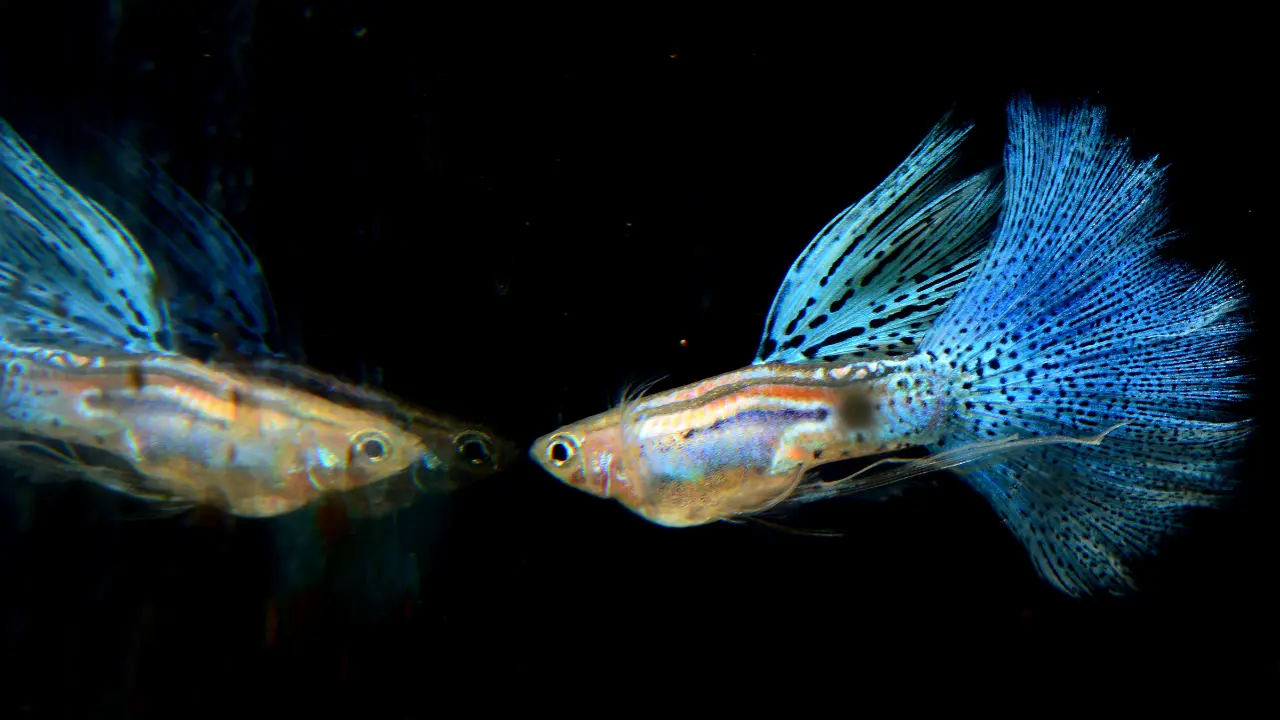We understand your curiosity about your Guppy’s diet. As these tiny marvels add life and color to our tank, it’s our responsibility to care for their dietary needs. However, sometimes it’s quite confusing to decide what to feed them. After all, these little fellas aren’t very talkative. But worry not, as you’ve come to the right spot! Today we will be discussing all that you need to know about the Guppy Diet. In this article, we will cover what do Guppies eat in the wild and in captivity. Moreover, we will explore various food options, their nutritional needs, and feeding guidelines.
Ever wondered if Guppies dine in like a family? Let’s answer that in a minute, till then here is some of the best food for guppies
- nutrient-rich bloodworms
- savory brine shrimp
- some surprise veggies
Now to answer your thoughts: Yes! Guppies eat like a family and they mostly dine in together. However, these eye-catching beauties might have a mind of their own for certain food options.
In the article below, I added some foods that make the bland guppy diet taste like it came straight from a five-star hotel. So, read it and your guppy might hire you as a chef!
What Do Guppies Eat
Guppies are small foodies that thrive on a variety of foods to fulfill their nutritional needs. Usually, Flake foods are staples in their diet as they provide essential nutrients. Also, they are good food options for fish that like to eat from the bottom or mid-level of the tank. However, our little tropical fellas need much more than just flakes.
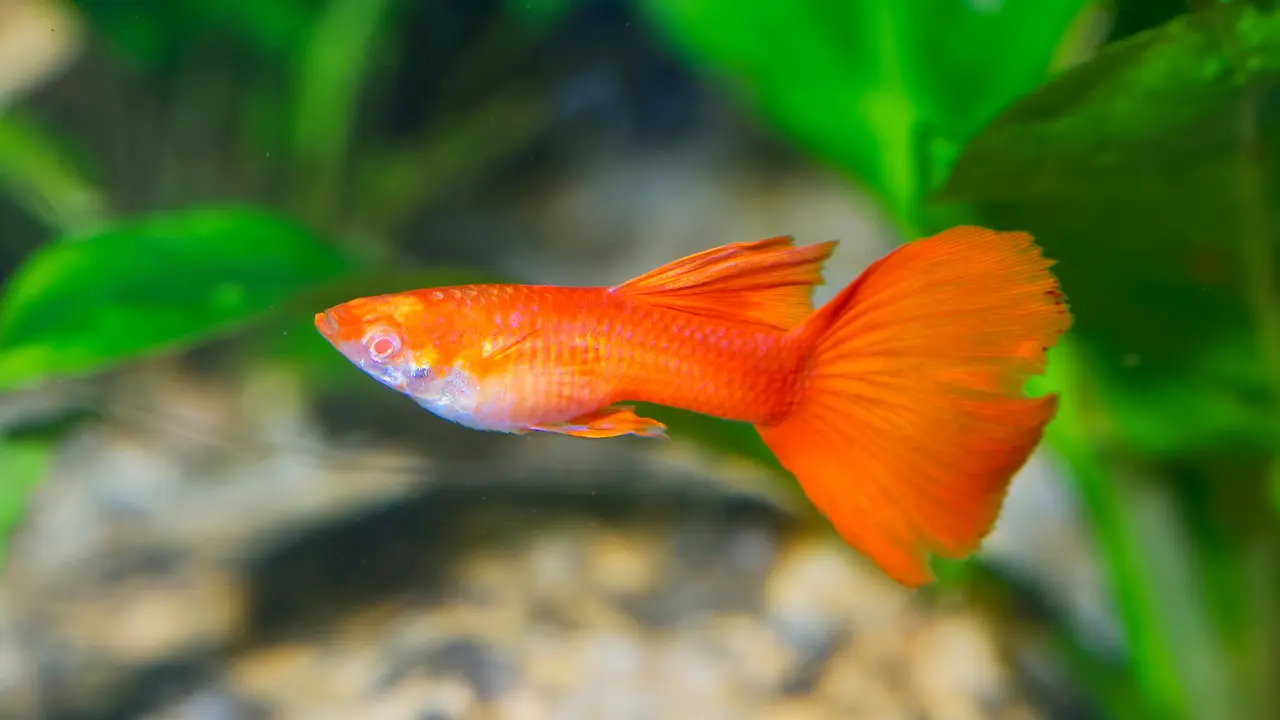
Here are some of the best food options for Guppies
- Flake food
- Pellet food
- Live brine shrimp
- Bloodworms
- Daphnia
- Mosquito larvae
- Tubifex worms
- Vegetables (peas, zucchini)
- Spirulina flakes
- Algae wafers
- Freeze-dried foods
- Mysis shrimp
- Krill
- Earthworms
- Fruit flies
- Insect larvae
- Spinach
- Lettuce
- Squash
- Blackworms
Providing Guppies with a varied diet is essential to maintain their happy lifestyle. Moreover, a good diet means a healthy Guppy with beautiful colors and natural behavior. The best way to do that is to mimic its natural diet and eating routine.
Monitor your fish to figure out its eating habits, what it likes, and what it doesn’t. Use this info to make a diet plan and follow it accordingly. Wondering what to feed guppies ? read the article below for a more detailed insight.
What Do Guppies Eat in the Wild
Guppies consume plants, larvae, algae, and small insects in the wild. Feeding guppies isn’t very hard as they are omnivores, meaning they eat vegetation and also meaty foods. Most of their diet includes mosquito larvae and small crustaceans. However, these fish have an instinct to hunt, thus they might prey on small fishes.
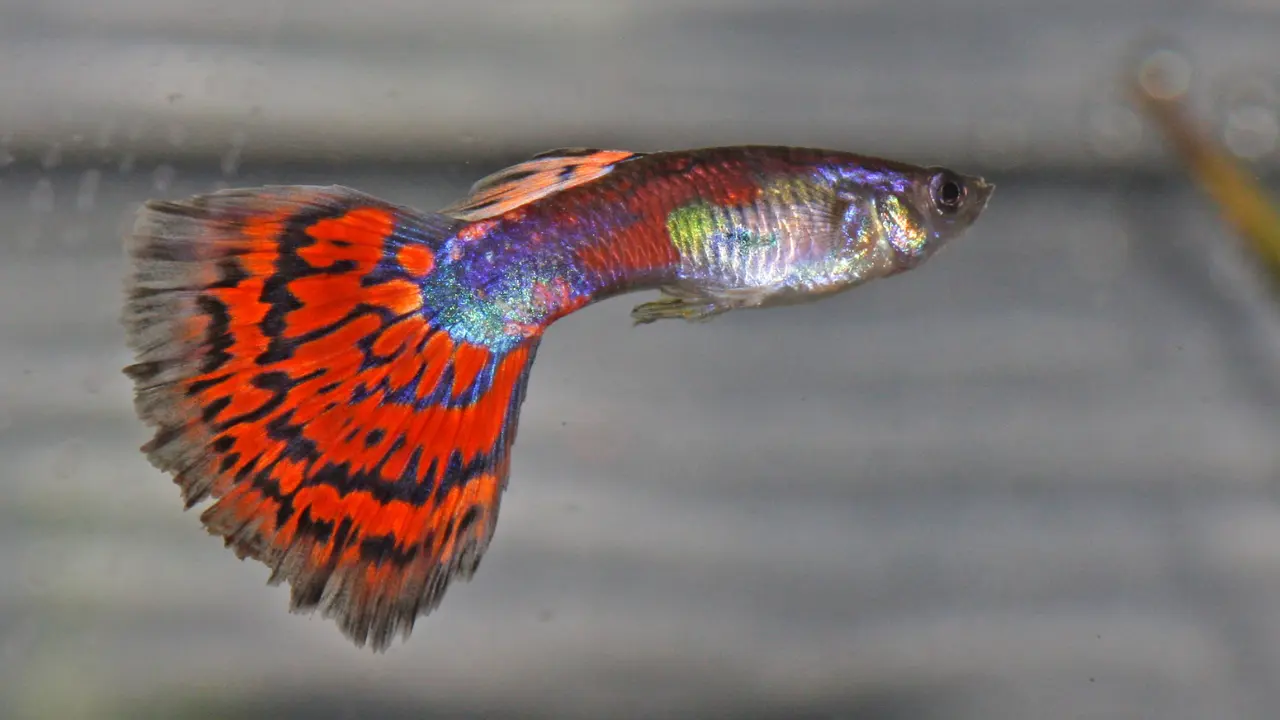
Guppies are opportunistic feeders which means that they will eat whatever is available. As discussed above, Guppies are very adaptable, so they manage with the resources that are at hand. Quite a ‘I can manage’ typa guy, right?
In addition, Guppies have a habit of eating all day long. This way they can maintain their energy level and stay active. As they need a lot of food to eat all day, they usually inhabit rivers and streams with abundant algae and food supply.
What Do Guppies Eat in Captivity
As Guppies are omnivores, they eat a variety of foods in captivity. For starters, guppy flakes, pellets, and live or frozen foods are staples in the guppy diet.
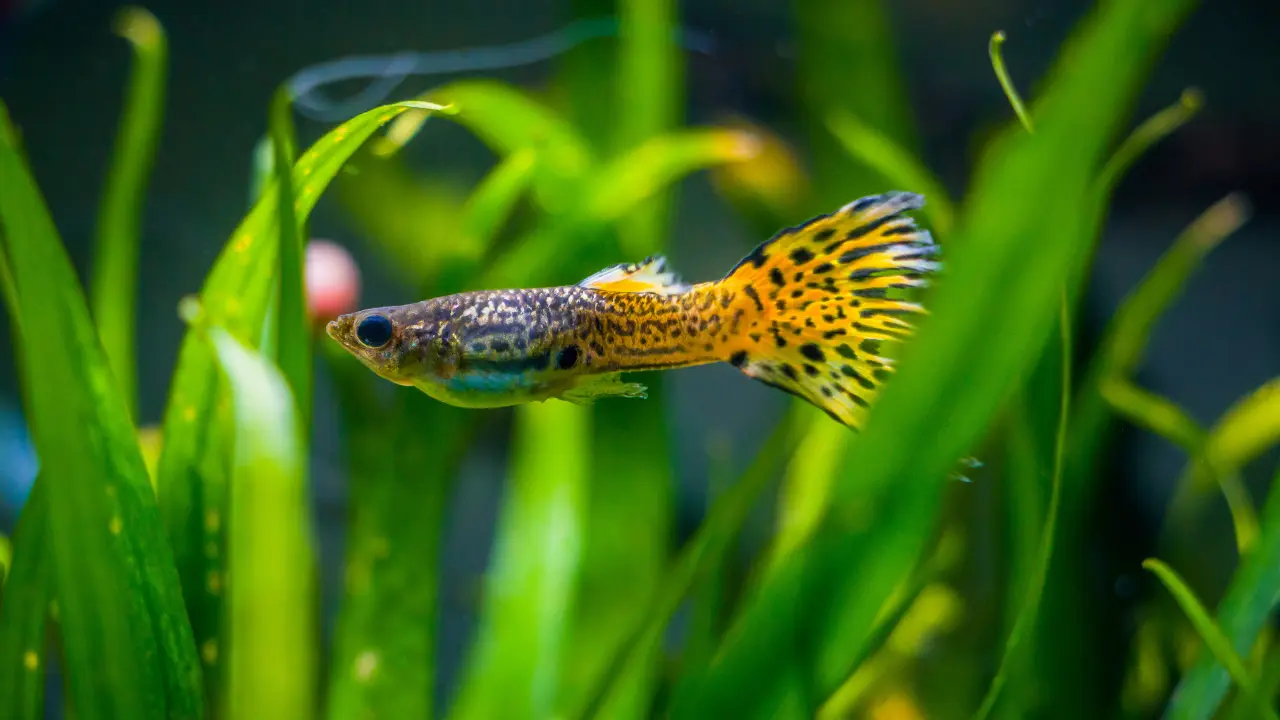
Here are some common guppy foods
- brine shrimp
- bloodworms
- daphnia
- Commercial guppy flakes and pallets
- zucchini
- spinach
- cucumber
These foods are essential to maintain a healthy and thriving lifestyle for Guppies. Moreover, Guppies like to graze on plantations and algae in the tank. So, adding live plants to the tank is a really good idea.
The vegetables mentioned above are a good source of fiber, so make sure you add some vegan treats. However, always provide blanched vegetables in small bite-sized pieces.
How to Feed Guppies
Always have a balanced diet for feeding guppies. As guppies eat a variety of foods, you should add a mix of commercial flakes, pellets, and live or frozen foods. Keep in mind that Guppies are omnivores, so they enjoy both meaty and vegan diets. But before serving anything, ensure you have the right portions and quantity.
No matter what, always avoid overfeeding as this can lead to various health problems.
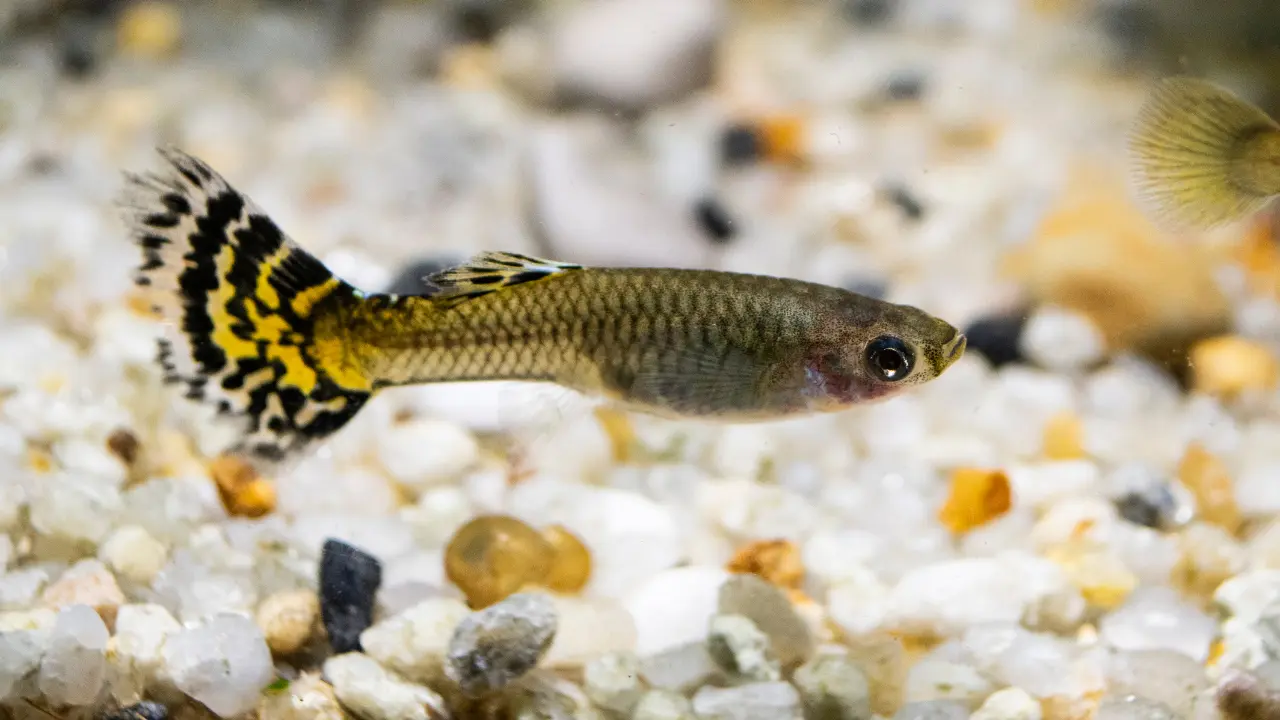
In terms of quantity, always feed small portions twice a day. The guppy should consume the food in about 2 to 3 minutes and there should be no leftovers. Uneaten food can pollute the water, harming both fish and tank ecosystems. The best way to figure out how much to feed them is to monitor how much they can eat in a single sitting!
Moreover, it is also good to supplement their diet with brine shrimp, and blood worms. However, these foods must be added sparingly to avoid contamination in the tank. Try your best to mimic the natural diet of guppies, but don’t be so hard on yourself.
Best Feeding Schedule for Guppies
Wondering: What to feed newborn guppies ? Juvenile guppies must be frequently fed small amounts of food. This frequently feeding the small guppies will promote rapid growth and development. You should feed them about 4 to 5 times a day. Crushed flakes or baby brine shrimp are the best guppy fry food as they provide nutrition for growth.
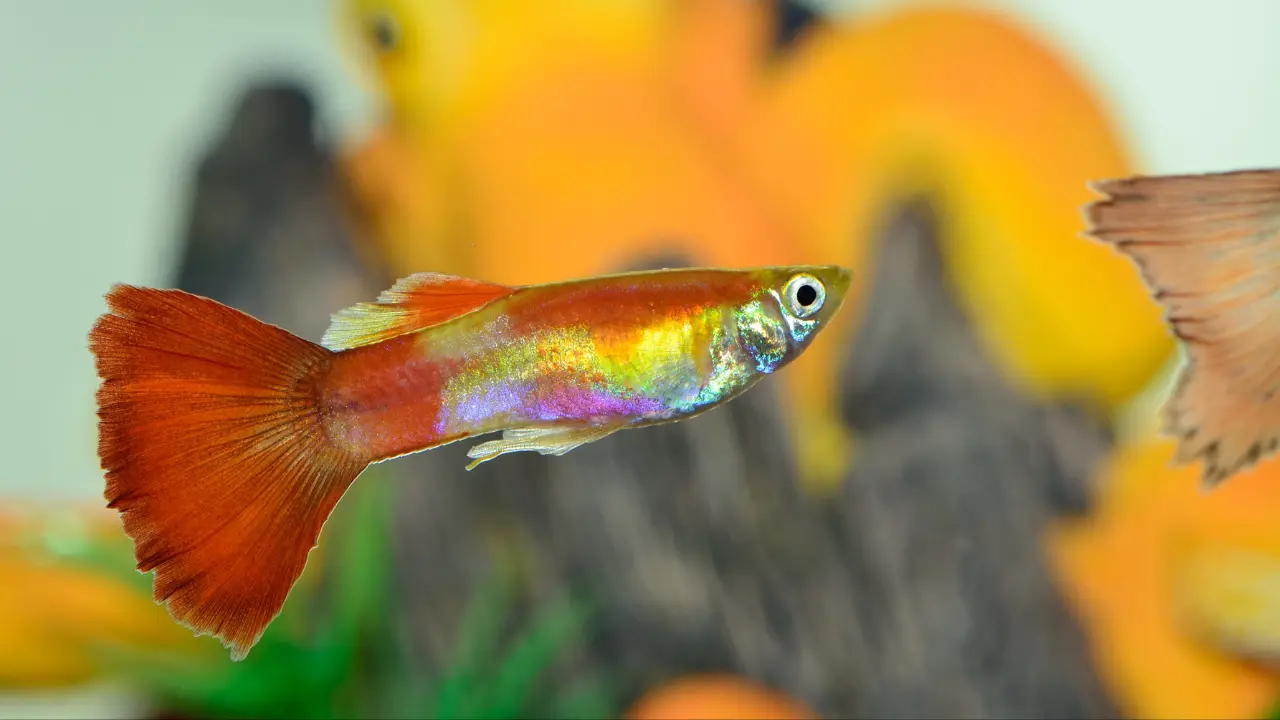
However, Adult guppies don’t need food frequently. But you should feed them relatively larger meals. It’s best to provide meals twice a day, one in the morning and the other in the evening.
Always provide your guppies with a balanced diet that has enough proteins, carbs, and vitamins. Follow the above guide to make a healthy meal plan for your guppies. In addition to that, it’s best to feed them flakes and palettes in the morning meal and meaty foods like daphnia in the evening meal. This will regulate their metabolism and fulfill their nutritional needs.
However, it’s important that you don’t overfeed your guppies. This can lead to many health and tank contamination issues. Make sure that a healthy amount of diet it served but not more than what’s required.
To figure out how much to feed guppies you should monitor the guppy’s eating habits. Make sure that you only provide enough food that they can finish in 2 to 3 minutes.
Understanding Guppy Diet
For ideal growth and health, you should know what your guppy requires. For that, you must understand what is your guppy’s nutritional requirement. Just like other fish, Guppies need a balanced diet with essential foods. Their diet must have protein, carbohydrates, fats, vitamins, and minerals for optimal well-being. Come along as we discuss the best foods for providing the optimum nutrition to your guppy!
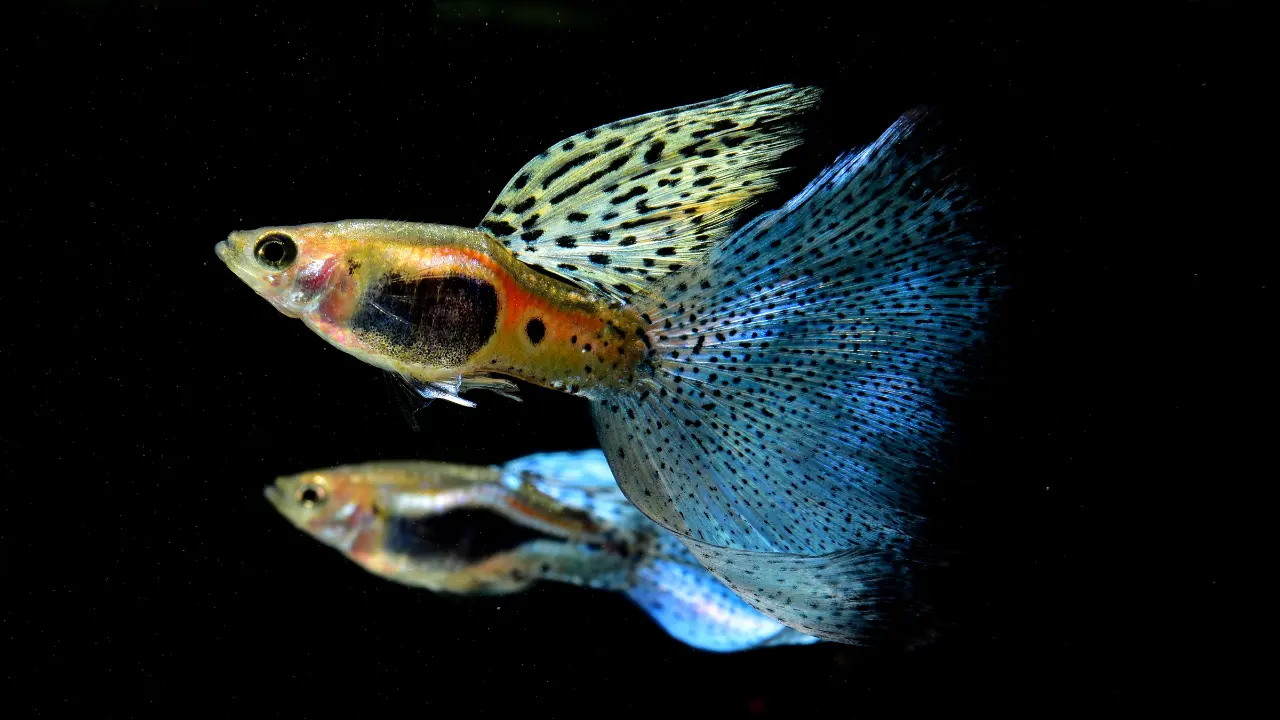
Carbs Requirement
Carbohydrates are as important for Guppies as they are for us. Carbs are an essential energy source so they must be a part of the guppy diet. The most dense sources of carbs include algae, plants, and commercial fish foods. Moreover, Carbs also help in digestion so make sure you add about 10 to 15 percent carbs in it’s diet for a happy guppy tummy!
Here are some good food for Guppies that are high in carbs
- spirulina
- algae wafer’s
- blanched vegetables like peas and zucchini
Fat Requirement
In addition, Fats are also important for a healthy guppy. Fats support important cell functions and protect against injury.
Here are some healthy fat sources for Guppies
- fish oil
- shrimp meal
- brine shrimp
- daphnia
Protein Requirement
Protein plays an important role in growth and development. So, you must provide a sufficient amount of protein in their diet. Ideally, the guppy diet must contain 40 to 45 percent protein-rich foods.
Here are some high in protein sources for Guppies
- Bloodworms
- Brine Shrimp
- Daphnia
- Mosquito Larvae
Vitamin Requirements
Guppies need a balanced diet with a lot of vitamins to maintain their vibrant colors and health. for example, Vitamin A is crucial for vision and a strong immune system, Vitamin D is important for proper bone development and Vitamin C is important for tissue repair and growth. Hence, we conclude that vitamins are not just essential but crucial for a healthy Guppy!
Here are some best food for guppy fish
- Brine shrimp
- Daphnia
- Spinach
- Peas
- Commercial flake foods
- Bloodworms
- Fish pellets
- Frozen fish foods
Types of Guppy Foods
Guppies aren’t very picky eaters so they eat whatever is at hand. However, when it’s about choosing their diet, it can be confusing as there is a huge variety of guppy food. Here is a general categorization of guppy foods to pick from.
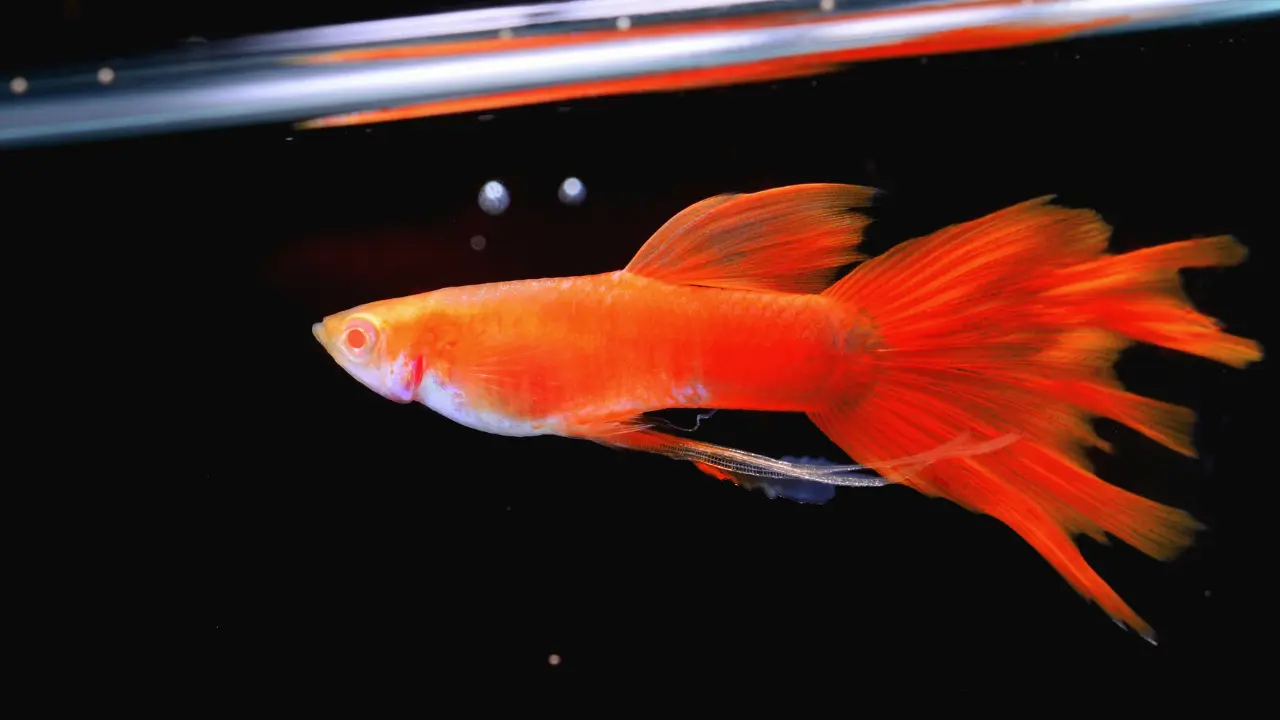
Live Guppy Foods
Live food is best for guppies as it mimics their natural food and satisfies their hunting nature. This meaty diet provides essential proteins and promotes development and growth. The most popular live foods include brine shrimp, daphnia, and mosquito larvae.
Wondering: Do guppies eat shrimp ? Yes, Brine shrimp is a favorite of many aquarists as it is like a super food for the guppies. Also, brine shrimp is easy to culture and the guppies love munching on it. Moreover, it’s an essential vitamin source that maintains the vibrant colors of guppies.
In addition, Daphnia is another great option. This tiny crustacean helps the guppy’s digestion and keeps the guppy’s gut healthy. Moreover, they also clean the tank water by consuming any organic waste.
Processed Guppy Foods
Processed guppy food is a quick and easy diet solution for the guppies. These foods are specially made for the guppies to fulfill their nutritional needs. Moreover, these foods simplify the feeding routine for guppy keepers. Some of the high-quality processed foods for Guppies include
- Good Partner Small Tropical Sinking Pellets
- Tetra BloodWorms 0.25 Oz, Freeze-Dried Food
- Hikari Micro Pellets
- Fluval Bug Bites Tropical Fish Food
These processed foods provide essential proteins, carbs, and nutrients for the fish. Moreover, they contain vital organic foods that enhance the guppy’s health and coloration.
Homemade Guppy Foods
home-cooked meals were reel-y better! Homecooked meals can be a breakthrough when choosing an ideal guppy diet. It is healthier and more cost-effective than the bought ones. Moreover, you control what goes into the guppy’s diet, so you can better manage the guppy’s nutrition.
A popular homemade food is a mix of vegetables and proteins. You just Blend some peas, spinach, and carrots with some meaty food and you’re done.
Moreover, you can add some fish fillets or protein-rich foods to this mixture. Make a puree of these ingredients and spread them on a sheet, then dehydrate them. Break the dried sheet of food into small pieces and feed these homemade flakes to your guppies. You can also store these flakes for weeks!
Signs You Are Overfeeding Your Guppies
Are your guppies getting a little too plump? Overfeeding is the most common mistake aquarists make. To figure out if you are overfeeding your guppies, here are some signs to check for
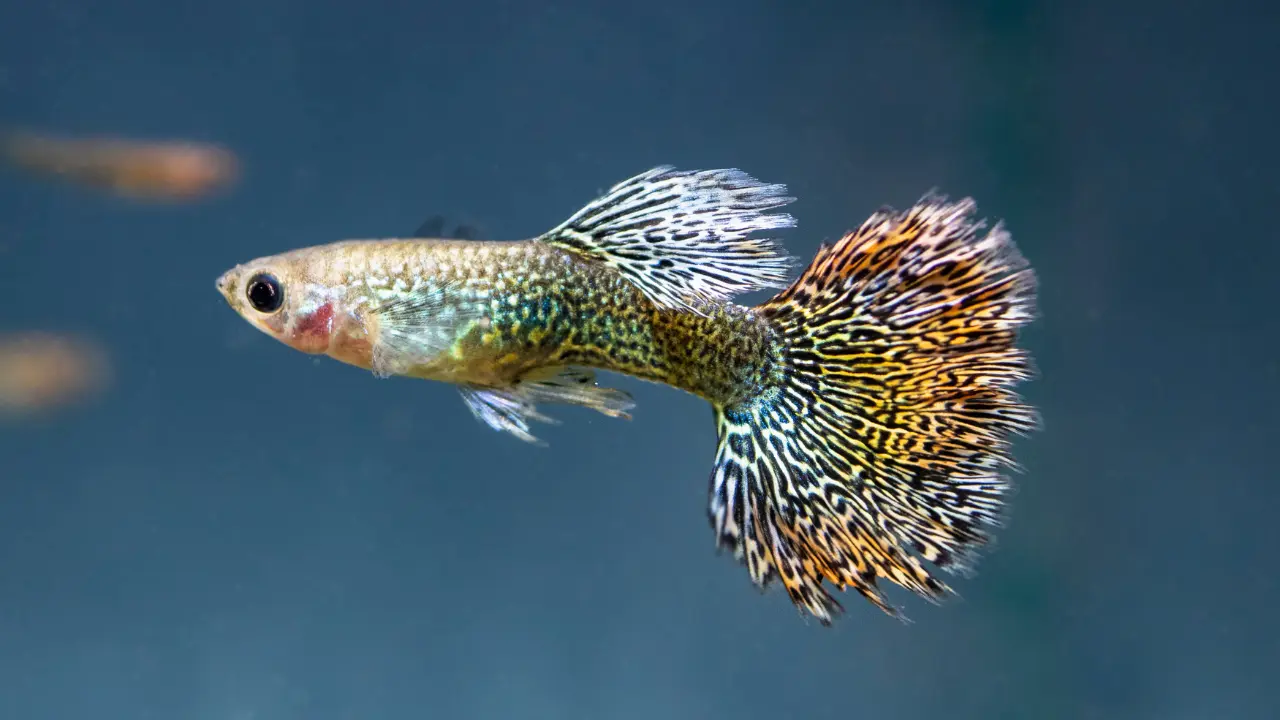
- Bulging bellies: Check if your fat guppy fish has a big ol’ mama belly, it could be a sign of overeating.
- Excess waste: If you see a lot of poo in the tank, or the tank water gets murky, it might be due to overfeeding the fish.
- Uneaten food: Guppies eat a lot, so there should be no leftovers in the tank, in case you see some, it might be overfeeding.
- Digestive issues: If your guppy is facing digestion issues, this can be a sign of overfeeding.
- Lethargy: overeating makes you lazy, and the same goes for the guppies. If your guppy isn’t as active as it usually is, overfeeding could be the reason.
- Disinterest in food: As said many times, this fish eats whatever it gets. So, it’s a rare case if it doesn’t munch food. In such cases, overfeeding may be the culprit.
FAQ’s
Can guppies eat tropical fish food?
Yes! Guppies can eat tropical fish but make sure it meets their nutritional requirements.
Best food for guppy growth?
High-quality flakes and pellet food should be provided for guppy growth. If your guppies are juveniles, you should crush these foods into fine little pieces for the guppies to consume easily. Occasionally provide meaty foods like brine shrimp and daphnia for quick development as these foods are high in protein. It’s best to cut these foods into tiny pieces.
How to Know When Guppies Are Hungry?
Guppies might swim near the surface or even beg for food when they are hungry. It’s best to have a feeding routine, so make one. This way your guppies will be hungry and waiting for food at a specific time.
Can guppies eat plants?
Yes! Guppies munch on algae and small plants but these food sources make up a small percentage of their diet.
What are some vegetables that guppies can eat?
Guppies can eat a variety of vegetables, but it’s best to offer zucchini, spinach, and peas in small amounts. Make sure all the veggies are blanched and finely chopped.
How often do I feed guppies?
You should feed your guppies twice a day. One meal in the morning and one in the evening. It is important to provide flakes and palettes in the morning meal and meaty foods like brine shrimp and daphnia in the evening meal.
How long can guppies go without eating?
Guppies are adaptive and can survive for almost a week without any food. However, this is not recommended to practice in captivity. Make sure you maintain a consistent feeding routine and fulfill the guppy’s dietary needs.
Conclusion
Wrapping everything up, today we discussed what to feed your guppies. Moreover, we explored the important aspects of the guppy diet along with nutritional needs.
All in all, guppies need a high-quality diet with ample proteins, nutrients, and carbs. Fulfilling these dietary needs is vital for a happy and thriving guppy. Moreover, these foods are required supplements to maintain the guppy’s color and grace.
We also discussed methods to maintain a healthy feeding routine for the guppies. In addition, we have provided a general plan to map your guppy’s diet.
However, if you still have any questions or want to share your thoughts, comment below!
Lastly, Not feeding extra is a part of feeding right! Make sure you don’t overfeed your guppy as it can lead to various health issues. Take a look at the article above to find out how to avoid overfeeding. Ensure their optimal health and happiness in our aquariums.

